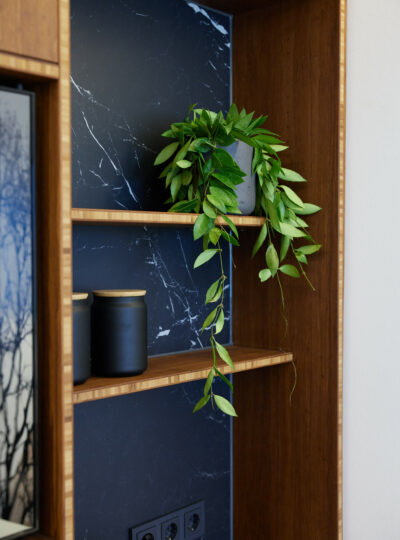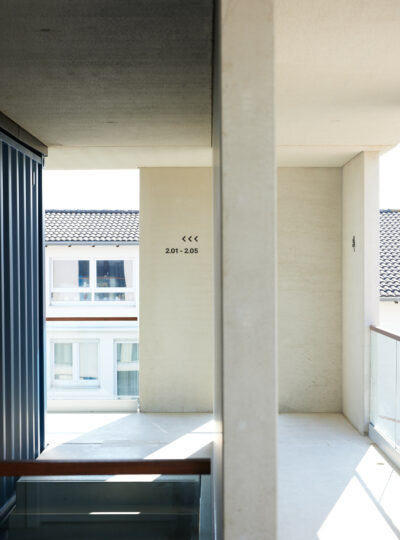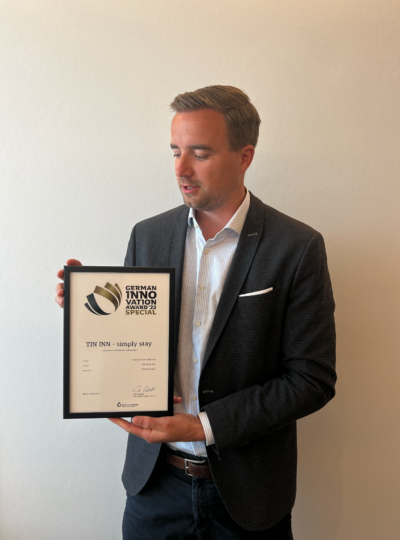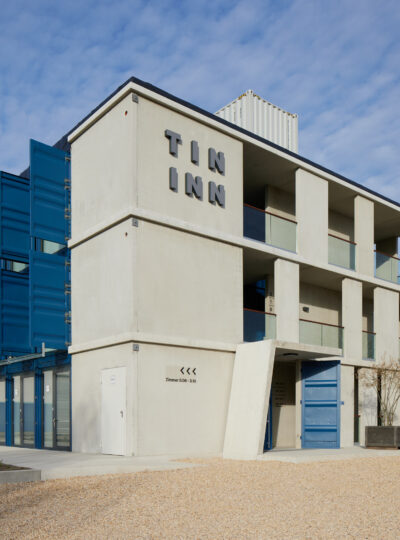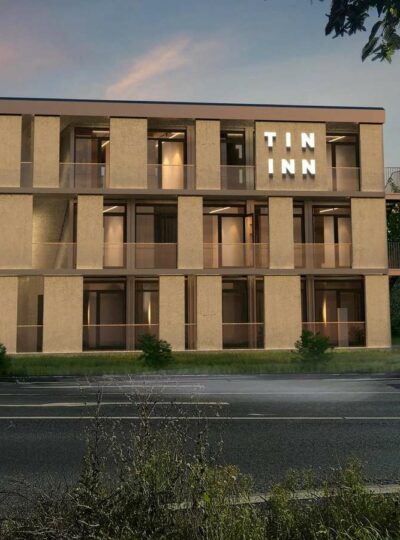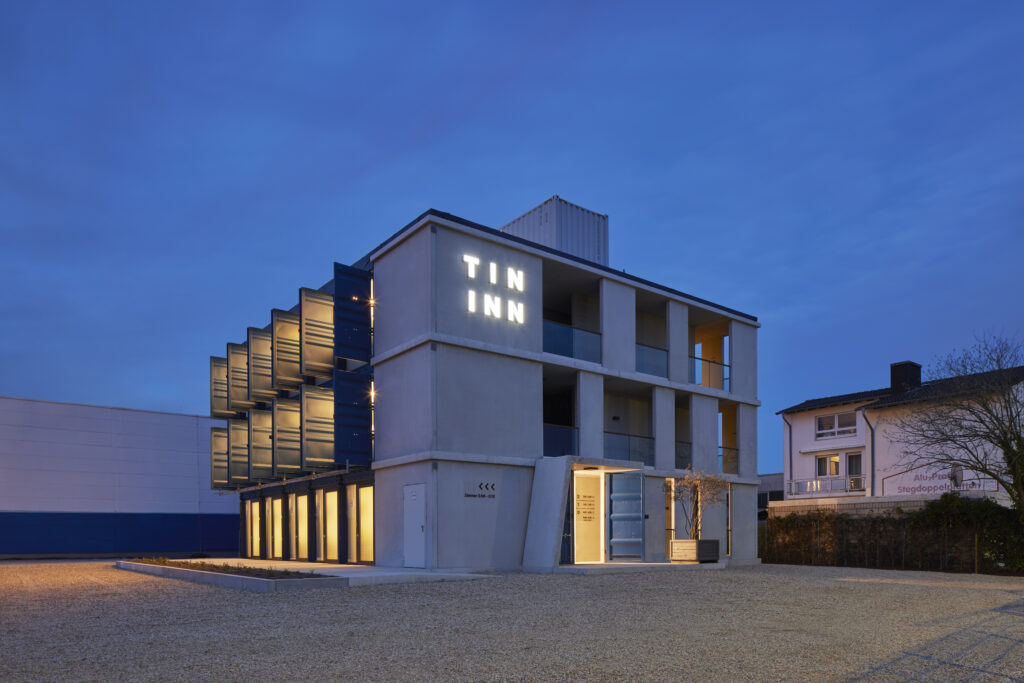
Discarded overseas containers are increasingly being used to accommodate hotel guests. Fast, inexpensive and sustainable accommodation can be created, which also convince with comfort and style.
By Stefanie Hütz
The first “Tin Inn” opened in Erkelenz at the beginning of May. The idea for the new hotel concept came from Ivan Mallinowski, Michael Haiser and Nico Sauerland, who regularly had problems finding overnight accommodations in rural regions and industrial centers.
The three men run the company Containerwerk, which converts used sea freight containers into high-quality room modules using a new, patented insulation process – whether for student dormitories, tiny houses, office buildings or even hotels. Now they close a discovered market luck itself. 15 containers on three floors with space for 20 rooms – that’s how Tin Inn hotel projects are designed to scale easily. The modules, including prefabricated bathrooms, are equipped turnkey by Containerwerk in its own plant.
The automated production processes are highly efficient. The transport is carried out by means of standard logistics. After delivery to the construction site, the building, which is ready for occupancy, is erected quietly in a few days using cargo cranes. The technology is housed in a container on the roof. “We can build a hotel more than 40 percent cheaper than with conventional construction methods,” says Nico Sauerland. And also significantly faster. In July, Tin Inn number two was launched in Montabaur, and number three is to follow shortly at the same location. “All contracts for House Four in Hückelhoven have been signed, and other sites are under negotiation and conception,” says the Tin Inn CEO, who reports strong municipal demand. Overnight rates for single rooms start at 60 euros, double rooms at 80 euros. “We are pleased with an extremely high occupancy rate and are more than satisfied so far,” sums up Nico Sauerland just under two months after the premiere in Erkelenz.
“We can build a hotel more than 40 percent cheaper than conventional construction.”
Nico Sauerland, Containerwerk
Construction with sustainable arguments
Tin Inn is a hotel-as-a-service concept: the companies Tin Inn and Containerwerk respectively are the owner, builder and architect. Tin Inn GmbH will partly take over the operation itself or cooperate with local franchise partners.
The operator of the Montabaur site, for example, is Natalie Mays, who has been managing partner of the Schlemmer Hotel in the city center since 1996. Mays himself had the idea for a container hotel and had also already acquired the suitable property on a former barracks site. “We had advanced plans of our own with an architect, but were getting nowhere with the issues of fire protection and thermal insulation. While googling, my husband discovered the company Containerwerk, which was clearly further ahead than us on the technical issues,” says Mays. “After we contacted them, we were quickly convinced of the Tin Inn concept.”
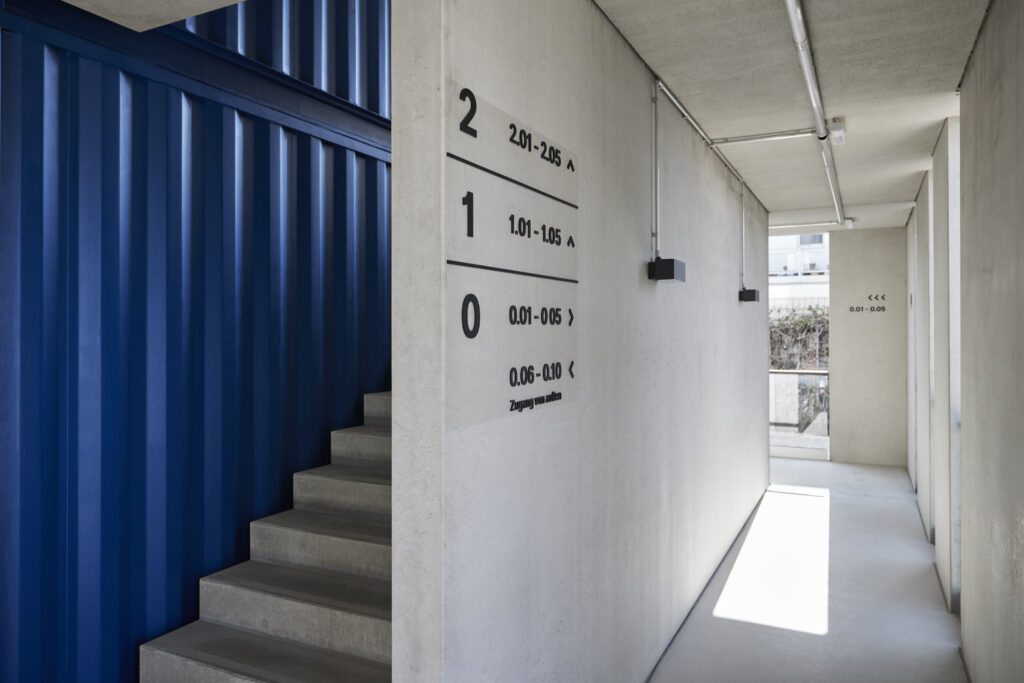
Urban: The bare concrete is particularly attractive in combination with the bright blue containers.
Carpets from fishing nets
Thus, this destination exceptionally includes two Tin Inn building complexes with a total of 34 shipping containers that house 41 rooms with 61 beds. In addition, there is a breakfast room. “With us, groups can also spend their vacations, because in our region the tourist approach is much more pronounced,” says the entrepreneur. The Tin Inn concept is characterized by sustainability, to which, according to the founders, the low surface sealing, the use of used containers instead of conventional building fabric, the air conditioning via heat pump technology and the high energy efficiency contribute. Each room is individually designed by interior designers, which makes it possible to use return stocks of well-known design furniture dealers. Fast-growing bamboo wood is used as well as carpets made from old fishing nets. Also worth mentioning: The Guest Journey is completely digital, there is no reception desk.
Slept in on the highway
Roatel is the name of another container hotel start-up – a portmanteau of the words “road” and “hotel.” After the EU legislated that truck drivers could no longer spend their weekly rest period exclusively in the driver’s cab, Ralf-Peter Kals, Martin Swart and Christian Theisen, who have their roots in logistics, founded the company in 2019.
Their “Roatels” are set up near the highway in rest areas or truck stops. A container is divided into four single rooms, each a good seven square meters in size, with their own entrance. The rooms “with a favorable price-quality ratio” are sound and heat insulated and have an electric air conditioner with heating. Everything necessary is placed in it: a bed, bench with table, TV, wardrobe, shower, sink and toilet. Reservations, billing, check-in and check-out are easily done electronically at my.roatel.com. Daily cleaning including fresh bed linen and towels is provided.
„In just one day, a container that we remove at our plant in Lower Saxony, set up and ready for operation,” says Christian Theisen, and: “As a rule, we operate the Roatels ourselves on the land of our site partners. They receive a lease payment from us. However, purchase is also an option, and we are also currently preparing a franchise variant as a mixed form.” So far, 15 Roatels have opened in 13 locations, and by the end of the year the number is expected to reach 35 across Germany. Up to 120,000 trucks are currently parked on German highways at night, so the potential is great, especially since other travelers are also added to the target group.
Simple redensification
In large cities, on the other hand, redensification is an increasingly relevant issue. The Niu Hide Berlin was built in 2019 as what it claims is the world’s first modular hotel on the roof of a shopping center parking garage. “Such central urban, previously unused spaces offer valuable space for hotel concepts,” says David Etmenan, CEO and owner of operator Novum Hospitality.
Although the project (developer was MQ Real Estate) did not use discarded shipping containers, the construction principle was similar: “The entire hotel was designed using energy-efficient modular timber construction and was largely prefabricated at Markus Schober’s factory in Bavaria. By focusing on modular additions to existing buildings, the company is a real pioneer,” explains Etmenan, adding, “We have had very good experience not only with the construction method but also with the flair that goes with it, and we are already in the planning stages for another The Niu modular hotel project in Passau.”
In the future, containers/modules should make it possible to build sustainably, quickly, reliably and flexibly. “Theoretically, new modules can be added or existing ones can be dismantled without leaving any residue and relocated to another site,” says Nico Sauerland as CFO of Containerwerk, and, “There are few limits to architectural imagination. Common rooms and public areas can also be designed basically well with overseas containers.”
